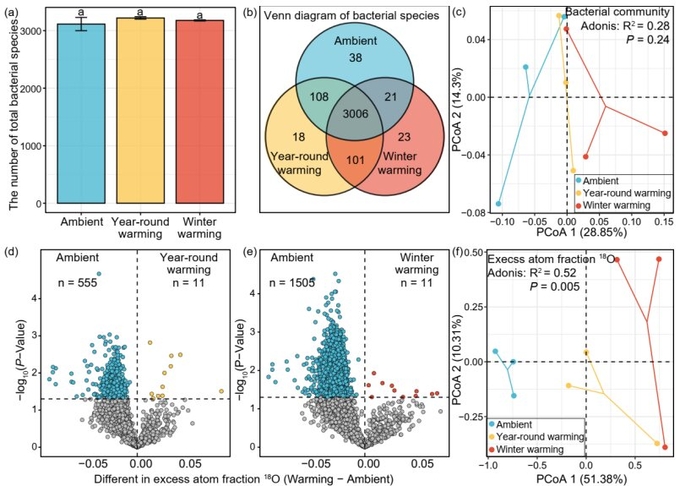May 30, 2025 | 04:50 GMT +7
May 30, 2025 | 04:50 GMT +7
Hotline: 0913.378.918
May 30, 2025 | 04:50 GMT +7
Hotline: 0913.378.918

Variation in bacterial community composition and excess atom fraction 18O of bacterial species.
A team of Earth scientists at Lanzhou University, working with a group of organic chemists from Nanjing Agricultural University and another colleague from Tsinghua University, all in China, has found that asymmetric climate warming reduces the ability of soil to sequester carbon more than symmetric warming. The findings are published in the Proceedings of the National Academy of Sciences.
Prior research has shown that the Earth is undergoing asymmetric global warming—more warming is experienced during winters than in summers. In this new effort, the researchers point out that few climate models take the asymmetric nature of warming into account, which is likely skewing the results.
To better understand the difference asymmetric warming might make, they began a decade-long study on the Tibetan plateau, where they artificially controlled temperatures on patches of ground over the years between 2011 and 2020. Some patches were left un-warmed; some were exposed to temperatures 2°C warmer than normal all throughout the year; others were warmed from 2.5 to 2.8°C more in the winter and 0.5 to 0.8°C more during the rest of the year. After 10 years, they tested the soil to see the impact of warming.
The first soil test involved measuring the growth rate of microbes in the soil, while the second tested carbon use efficiency. The first test was to determine whether the microbes use carbon from the air to grow. The second test measured the amount of CO2 microbes respirated back into the air. Prior research has suggested that soil microbes tend to bulk up more under colder temperatures and thus respire less CO2.
The research team found that the soil heated symmetrically saw a decline in growth rates of 31% and a decline in efficiency of 22%. They also found worse conditions for the soil exposed to asymmetric heating—there, the declines in growth rate were 58% and 81% for efficiency.
The researchers suggest asymmetric warming is reducing carbon absorption rates in cold regions such as the poles and mountaintops—a finding that should be reflected in climate models.
(Phys.org)

(VAN) Vikas Rambal has quietly built a $5 billion business empire in manufacturing, property and solar, and catapulted onto the Rich List.

(VAN) Available cropland now at less than five percent, according to latest geospatial assessment from FAO and UNOSAT.

(VAN) Alt Carbon has raised $12 million in a seed round as it plans to scale its carbon dioxide removal work in the South Asian nation.

(VAN) Attempts to bring down the price of the Japanese staple have had little effect amid a cost-of-living crisis.

(VAN) Fourth most important food crop in peril as Latin America and Caribbean suffer from slow-onset climate disaster.

(VAN) Shifting market dynamics and the noise around new legislation has propelled Trouw Nutrition’s research around early life nutrition in poultry. Today, it continues to be a key area of research.

(VAN) India is concerned about its food security and the livelihoods of its farmers if more US food imports are allowed.